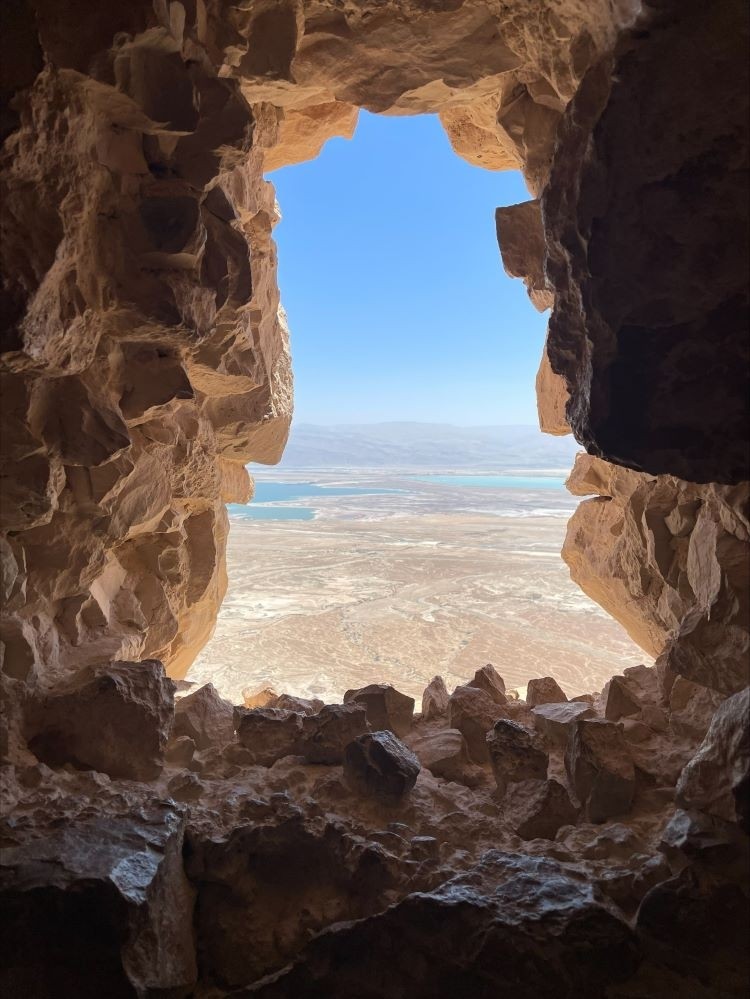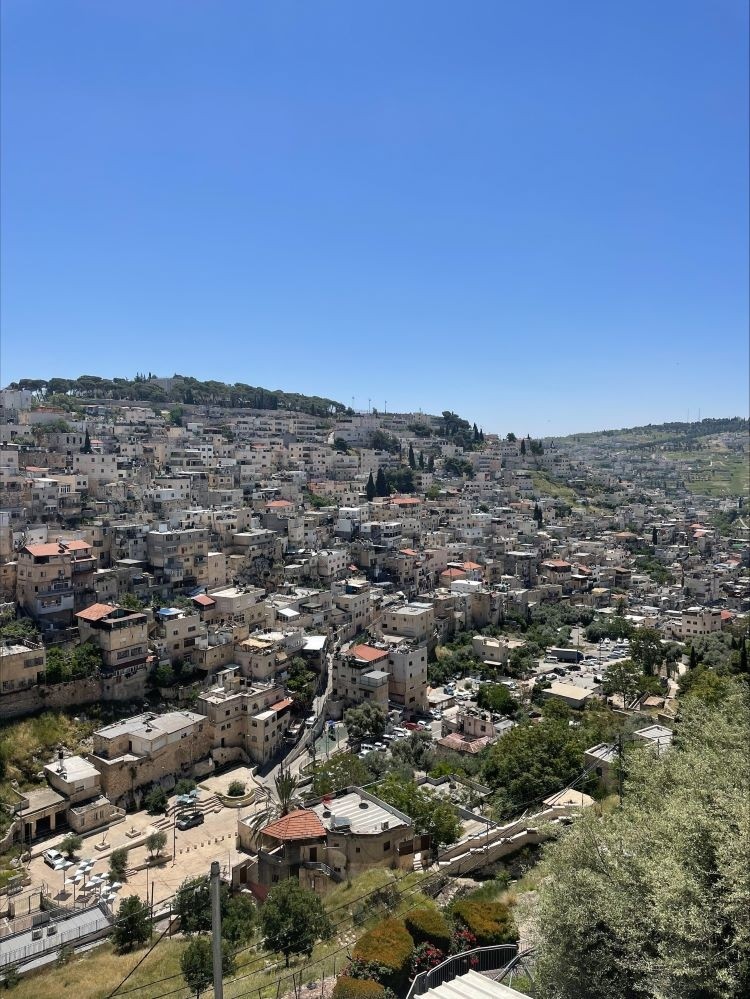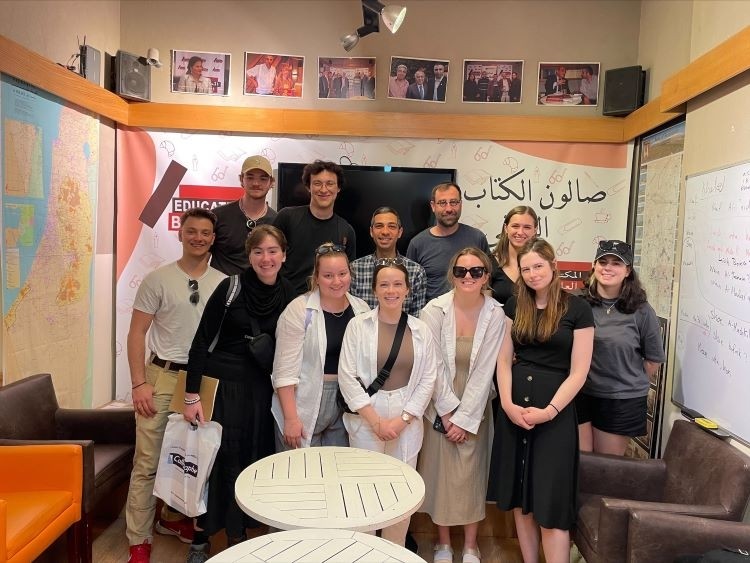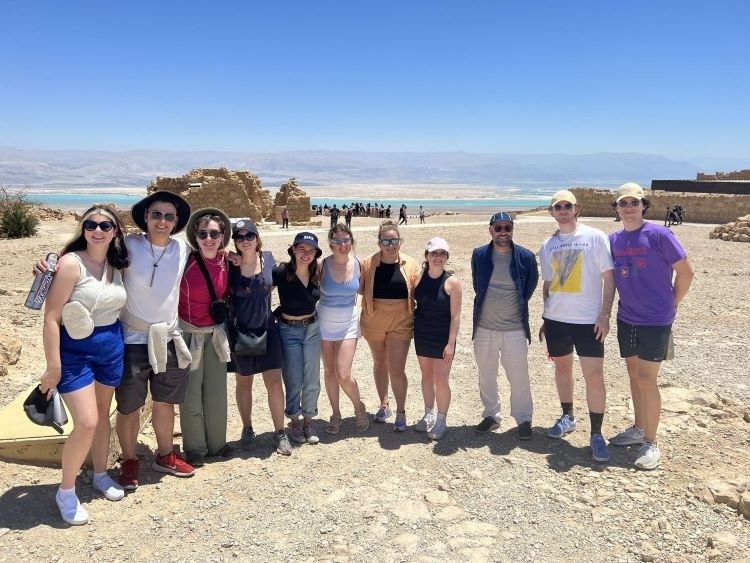
Everywhere they went—from ordering falafel sandwiches to touring the Israeli Supreme Court—10 StFX students and their professor Dr. Jamie Levin encountered modern history, while also gaining a more nuanced understanding of the Israeli-Palestinian conflict during a 10-day experiential political science course in Israel and Palestine.
“It was remarkable,” says Dr. Levin, the StFX political science professor who led and organized the full credit course, Fault Lines in Israel/Palestine, that included extensive readings and assignments before the on-the-ground experience April 25 to May 5.
It’s the first time StFX offered the course, the only program of its type in Canada, which saw students learn about the complexities of the Israel Palestine relationship by visiting sites of importance and speaking with experts and locals.
The trip was made possible through a generous donation from the Larry and Judy Tanenbaum Family Foundation that funded 10 scholarships of $4,500 each in addition to thousands of dollars of institutional support.
The Mulroney Institute at StFX also generously contributed $10,000 in financial support to the program and provided institutional support.

Dr. Levin says he and the students arrived at an interesting time in Israel’s young history, arriving as it marked its 75th anniversary of independence, and on week 14 of massive nationwide social protests, drawing tens of thousands of people to the streets against a judicial overhaul policy believed by many to threaten vital government checks and balances.
The protests, he said, held a peaceful, almost celebratory vibe with bands set up and families in attendance.
Everyone they encountered, be they for it or against, held a strong position on the hugely divisive and controversial policy, he said.
“The students had an opportunity to see this. We’re coming from a society that is politically jaded and apathetic, particularly in the student age cohort, to a country where there is zero apathy and 100 per cent engagement.
“People are on the streets, every week, with their parents and grandparents. That was a transformative experience for the students,” he said.
“One of the things that we try to do is to imbue that politics is everywhere and in everything, and that can be a tough nut to crack in Canada where many young people believe it doesn’t matter, it doesn’t affect them, or they would have little influence over it.
“To go and see this political vibrancy…it awakened something in our students,” he says. “To go there and see there are layers of complexity and nuance, and to be able to relate that back to your own experience, to me this is profound. Students start asking these questions and the hope is they never stop.”
Dr. Levin says part of the reason he wanted to offer the course is to give students a humanizing experience.
“What I hope they get out of this is a real familiarity…a literacy about this place, the names and places we see in the news all the time…that these become real places to them, real people, that they approach the conflict with a nuanced understanding.”

Dr. Levin says the students learned about the conflict and this special place in the world through a rich tapestry of planned activities and unscripted, informal encounters.
“They developed a literacy and confidence to read the news differently,” he says. And even if those memories and connections fade, that’s okay. They’ve developed a political literacy and an ability to see humanity that they can bring with them to whatever is important to them.
ONCE-IN-A-LIFETIME OPPORTUNITY
For students, the experience was transformative.
“This experience has already had such a significant impact on me and my perspective about the conflict and even about issues going on here in Canada,” says Katherine Starr, a third year honours public policy and governance student from Newmarket, ON who is doing a subsidiary in political science.
“Having the opportunity and privilege to visit this country and explore the depths of this conflict on-the-ground is something so unique that many people may never get the chance to do. I feel as though we got as close as we could, even if for only 10 days, to really unpacking the conflict and all its complexities.”
Ms. Starr says she feels so lucky to have been chosen for such a distinguished scholarship and the fact that StFX is providing these opportunities to students, no matter their financial abilities, is amazing. “I know this trip is a first for the university, and I cannot speak more highly of how well it was planned and executed.”

Going to such a fascinating and politically charged place is something she always dreamed of doing, “and being able to do so with experts in the area, is invaluable.”
Ms. Starr says it’s impossible to narrow down a favourite moment as every day was exceptional, packed with tours and time spent with guest speakers and locals. A moment that does stand out came visiting Rabin’s Square in Tel Aviv.
As part of pre-departure tasks, each student wrote a book review about the Israeli-Palestinian conflict. She chose Killing a King: The Assassination of Yitzhak Rabin and the Remaking of Israel, relating events that led to the assassination of Israel’s prime minister in 1995. “As we descended the same set of stairs that the late prime minister did just moments before his death, we all got to witness a peace rally of around 30 demonstrators singing the national anthem, chanting for peace and democracy, and laying roses on Rabin’s memorial. This event is remembered as one of Israel’s darkest chapters, where many argue that peace died the same day Rabin did. Yet, nearly three decades later, Israelis took to the streets to express their views and hopes for peace despite all that stands in their way…Despite nearly three decades later, citizens across Israel still believe in what their former prime minister did, and are willing to put their lives on hold time and time again to ensure they get the chance to fight for what they believe in.”
These protests, she says, reveal such a distinct feature about Israeli society—even with much strife and discord in the country, people will come together in solidarity (even if not with their political leaders or policies) because they believe in Israel as a bigger symbol of importance (which is different for everyone), worthy of being defended.

DEEPER UNDERSTANDING
The idea for the course originated with Dr. Levin who has researched and taught about the Israel-Palestine conflict.
“It’s a course I love to teach, but inevitably, I want students to be able to see, to touch, the things they talk about, to understand it’s a real place with real lives. It’s very far away and filtered through a lens that isn’t always reflective of the lived experience.
“From a teaching standpoint, it’s one of most interesting places I’ve been.”
As Dr. Levin explored the possibility, the challenge remained how to do it cost-effectively. He approached StFX Advancement, and together they developed a proposal in March 2020 for the Tanenbaum Foundation. However, as the COVID-19 pandemic washed over the world, plans were put on hold.
As the world eased open, the Tanenbaum Foundation supported an online program, which Dr. Levin brought virtually into the classroom, and when travel resumed, the Tanenbaum Foundation supported the course.
“We are very lucky to have the foundation believe in the program,” says Dr. Levin, who is hoping it may become an annual event.
Dr. Levin also expressed gratitude to StFX Service Learning and the Office of Internationalization for all their help in preparing for the trip.

